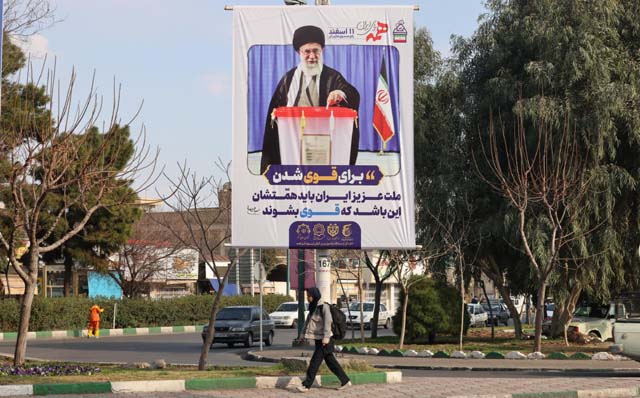
TEHRAN, March 1, 2024 (BSS/AFP) - Iranians are to vote Friday in elections
for parliament and a key clerical body, amid fears of a low turnout and with
conservatives expected to tighten their grip on power.
Since the last elections, Iran has been badly affected by international
sanctions that have led to an economic crisis. It has also been rocked by
widespread protests and drawn into escalating regional tensions over the
Israel-Hamas war.
More than 61 million people out of Iran's 85-million population are eligible
to vote for members of parliament as well as the clerics of the Assembly of
Experts, the body in charge of selecting Iran's supreme leader.
A low turnout is expected, however, after a state TV poll found more than
half of respondents were indifferent about the elections.
The country's last parliamentary elections in 2020 had a voter turnout of
42.57 percent -- the lowest since the 1979 Islamic Revolution.
Iran's supreme leader Ayatollah Ali Khamenei has appealed for a strong
turnout.
"It is important to show the world that the nation is mobilised," said
Khamenei on Wednesday on the last day of campaigning.
"The enemies of Iran want to see if the people are present," he said, adding
that otherwise "they will threaten your security in one way or another".
Those watching included the United States "most of the Europeans, evil
Zionists, capitalists and big companies", he said.
Khamenei said the United States and Israel, which "carefully" follow Iran's
issues, "are afraid of the people's participation in the elections".
The head of Iran's Islamic Revolutionary Guard Corps (IRGC), Hossein Salami,
said on Thursday that "every vote is like a missile that is fired into the
heart of our strongest enemies".
"If our people want to participate in a powerful political battle like in the
past and overcome the enemies, they should come to the stage and vote."
The IRGC, the ideological defenders of the Islamic republic, noted that
"strong participation" would discourage "foreign interventions".
Iran considers the United States, its Western allies and Israel "enemies" of
the state and accuses them of seeking to intervene in its internal affairs.
- 'Far from free' -
Candidates for parliament are vetted by the Guardian Council, whose members
are either appointed or approved by the supreme leader.
They have approved a total of 15,200 candidates, out of nearly 49,000
applicants, to run for seats in the 290-member parliament.
Conservatives and ultra-conservatives, who hold 232 out 290 seats in the 2020
parliament after reformist and moderate candidates were disqualified from
running, are expected by analysts to dominate once again.
A coalition of parties called the Reform Front said it would not take part in
"meaningless, non-competitive and ineffective elections".
Former Iranian president, the reformist Mohammad Khatami, was quoted in
February by the conservative Javan daily as saying that Iran was "very far
from free and competitive elections".
Conservatives are also expected to maintain a firm grip on the Assembly of
Experts, an 88-member body exclusively made up of male Islamic scholars.
A total of 144 candidates are running but many hopefuls were disqualified,
including former moderate president Hassan Rouhani.
Friday's elections are the first since Iran was rocked by mass protests
triggered by the September 2022 death in custody of Mahsa Amini.
Amini, a 22-year-old Iranian Kurd, had been arrested for allegedly violating
the Islamic republic's strict dress code for women.
Meanwhile, the Israel-Hamas war has sent tensions in the region soaring, with
pro-Tehran groups in Lebanon, Iraq, Syria and Yemen all involved in clashes
with either Israel or its Western allies.
The elections also take place amid crippling international sanctions and
mounting economic hardship in Iran, where inflation has hovered around 50
percent and the rial has sharply declined against the dollar.
"The prices are extremely high and continue to increase," Masoumeh, a 40-
year-old housewife, told AFP in Tehran's Grand Bazaar.
"I don't think that the representatives who will be elected will be able to
improve this situation."